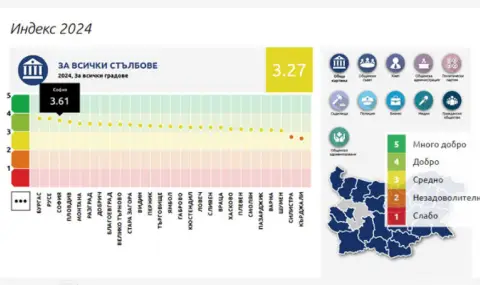The Transparency Without Borders Association (TBA) has published the results of the Local Integrity System Index for 2024, which highlight a 10-year progress in the transparency and accountability of local government in Bulgaria, the Bulgarian National Radio reported.
At the beginning of the implementation of the indicator - in 2015, the overall index was 3.14 points, while in 2024 it reached 3.27 points - an indicator of sustainable strengthening of local institutions.
The TBA explains that the results show that the digitalization of administrative services and the publicity of registers have significantly improved transparency. The growth of the indices of municipal administrations and mayors is due to the expansion of electronic services, improved communication with businesses and citizens, and increased publicity of budgets and local projects.
Civil society organizations remain an active participant in the process, monitoring institutions and promoting the introduction of good practices. However, the implementation of laws on transparency and whistleblower protection is often formal.
"The index of the local integrity system is an assessment tool, but also a factor for creating competition between individual municipalities, with the aim of improving administrative capacity and involving citizens in governance. Better transparency leads to conditions for municipalities themselves to become more attractive for investments," Kalin Slavov, executive director of APBG, emphasized in his comment to BNR-Radio Sofia.
He pointed out that the leading municipalities are Burgas and Ruse, followed by Sofia. But "large municipalities have a lot of resources for administration and put them first. Small municipalities are under excessive stress within the administration.
"The index also has practical value - the three key ministries - finance, economy and MRDPW take it into account when allocating funds due to better transparency of expenses and their effectiveness," Slavov also said.
He paid special attention to the easy exchange of good practices between municipalities, which leads to many improvements in management.
An example of this is the discussion of the municipal budget, as well as the profiles of municipal councilors - information on what issues each of them is active on, in what committees they participate, etc. This is productive and useful for the residents of the respective municipality.
